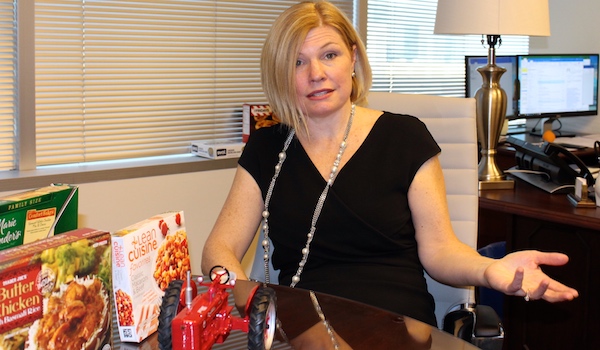Food safety, market growth on front burner for Bodor at AFFI
Food safety, market growth on front burner for Bodor at AFFI
- January 6, 2017 |
-
 WILLIAM EHART
WILLIAM EHART

First-time CEO seeks ways to increase frozen food consumption; despite her own expertise, she won't micromanage scientific staff

Alison Bodor has led the American Frozen Food Institute since May.
Alison Bodor—CEO of $7 million-revenue American Frozen Food Institute since May—brings a scientific and technical background to an industry that needs it, as the FDA begins implementation of new food safety regulations.
But Bodor also knows the industry needs to tell its story better: The frozen food aisle has come a long way from TV dinners. That evolution, in turn, has created opportunities for new membership in the association from emerging companies in the field—smaller businesses that need AFFI's help with regulatory compliance.
"Our number one priority (in 2017) is going to be around food safety," she told CEO Update in an interview at AFFI headquarters in McLean, Va., as the organization was finalizing its new strategic plan.
The former executive vice president of the $14 million-revenue National Confectioners Association is determined to strike the right balance—now that she is in her first chief executive role—by focusing on overall strategy and resisting any temptation to micromanage AFFI's technical staff.
Though she has spent her career in the food industry and earned her undergraduate degree in food science from Cornell (Bodor also has an MBA from the Smith School of Business at the University of Maryland), she intends to empower an AFFI scientific and regulatory department that she says is top notch.
"It's alluring to get into the details because I'm very familiar with them," Bodor said.
"I can talk nutrition, I can talk food safety, I can get into the weeds if I need to. But I've got an excellent staff now to do that for me, so I need to make sure they've got the ownership of the issues that makes it satisfying for them, and that we find the right level of give and take as a staff and CEO, where my direction and advice and counsel can assist my staff in execution but they're doing the bulk of that work," she said.
Entrepreneurial bent
Bodor also hired a senior vice president of industry development—a position she created—to bolster membership.
Brandon Partridge, who joined AFFI in October, founded Skyland Foods, which made organic, reduced-sugar drinkable yogurt. The company closed in late 2014, but Bodor said Partridge has the entrepreneurial spirit she is looking for.
"He is going to focus on member satisfaction, making sure our relationships with existing members are strong and deep, and on growing membership, particularly with some of the newer companies that are getting into the industry," Bodor said.
"We have this great diversity. We have large companies that play such an important role and are so dominant, yet there's always opportunity for new, innovative companies and AFFI is a great venue for that," she said. "In the frozen category, there's a whole slew of new companies that are emerging and developing products: organic, non-GMO, low carb, high protein, low fat, low sodium, or full-on Super Bowl appetizers."
Bodor also has hired a new chief lobbyist, Chelsee Woodey, who was formerly director of legislative affairs at the International Dairy Foods Association.
"We will have an extremely strong advocacy team here," she said. "My scientific and regulatory team is one of the best, and advocacy is a strong component of the strategic plan. We will focus on those issues that matter most to the frozen food industry, being careful not to duplicate what other associations are doing."
Shifting consumer campaign
Though boosting consumption of frozen food is a priority—as it was under predecessor Kraig Naasz—Bodor said AFFI members are cutting back on the consumer awareness campaign they launched in 2014. (The "Frozen. How Fresh Stays Fresh" campaign originally had a projected three-year budget of $150 million, Naasz told CEO Update in 2013.)
"We are stepping back from that campaign," Bodor said. "It's very expensive to do a consumer campaign. We might look at an influencer type of campaign, but I don't want to presume in this effort that we're going to be doing a traditional consumer campaign. We are going to look at all the different things we can do."
Influencer campaigns, as opposed to big-budget advertising efforts, enlist celebrities, industry professionals (in AFFI's case that might include nutritionists and dieticians), bloggers and researchers to change consumer attitudes.
"One of our goals in our new strategic plan is to increase consumption, and we are going to spend a lot of time over 2017 understanding what that's going to mean for the association and what are the levers that are appropriate for the association to pull.
"There will be lots of opportunities for those small companies and emerging companies, but also for the larger companies that have been members for a long time," Bodor said.
